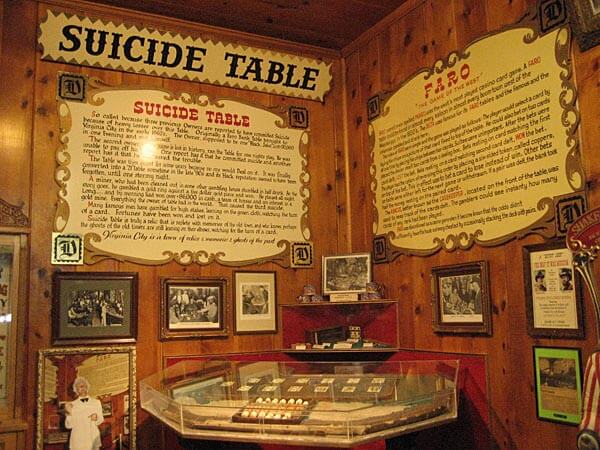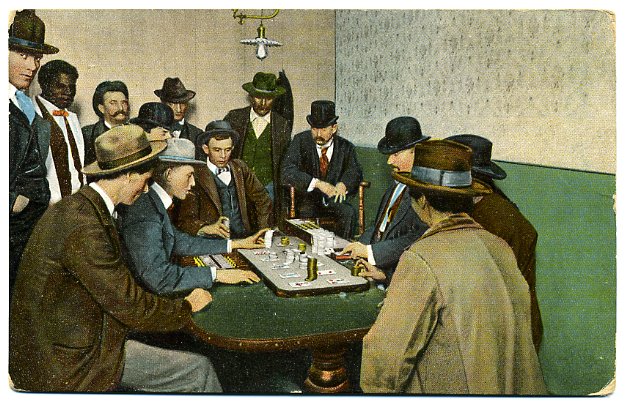Add Text Here...
History of the Knights of the Green Cloth
During most of the 19th century, one of the most lucrative businesses was that of the professional gambler. Those sporting men that excelled in the art of the games of chance, honored by many, hated by reform and feared by protective of their wallets. Faro was the game of choice, where the odds were nearly 50-50, unless cheating prevailed.
Faro made it's way into the United States by way of the predominately French community of New Orleans. Twenty years prior to the Civil War, gambling flourished along the Mississippi River from New Orleans to St. Louis. One of the popular gambling games was vingt-et-un (an old version of twenty-one), and another was Mexican Monte. But the most popular game was undoubtedly faro. Is was alluring, fast, fun, and easy to play.
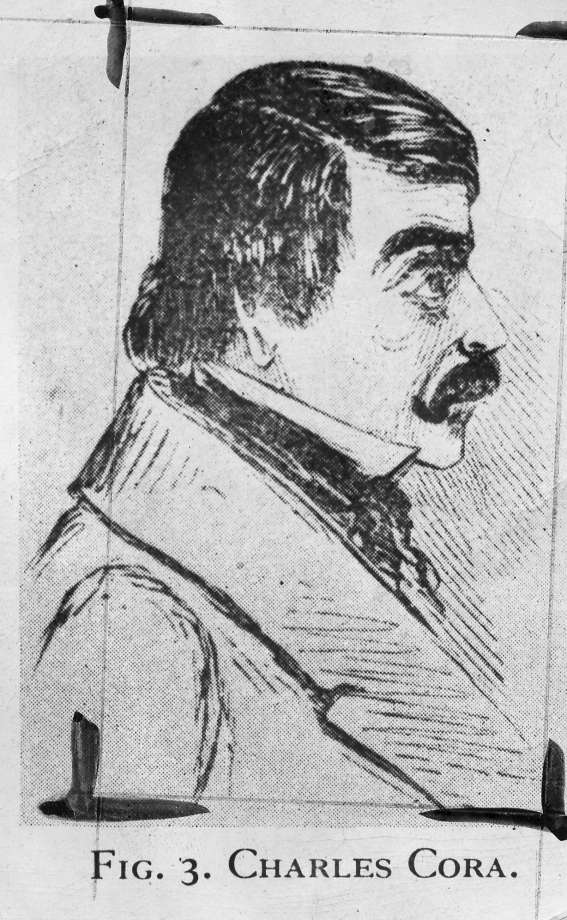
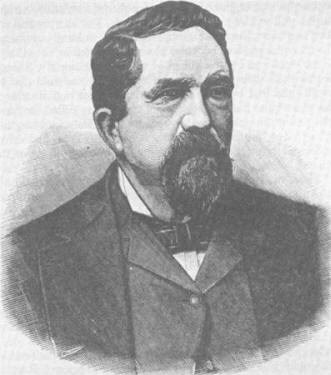

The foremost faro dealer on the Mississippi was Italian immigrant Charles Cora. He won $85,000 in six months and was banned from many resorts. J.J. Bryant, perhaps the best-known gambler on the river, lost thousands to Cora.
It was during this time a young runaway found work as a cabin boy on a riverboat, and began leading the various card games and cons. From then on George Devol claimed, "I intend to live off fools and suckers and I will make money rain." And so he did.
Add Text Here...
The California Gold rush of 1849 attracted many of the paddle-wheel gamblers to San Francisco, including Charles Cora and J.J. Bryant. Cora continued his success at the faro table, but his luck ran out when he killed U.S. Marshal William Richardson in 1855. He was found guilty and hanged. Bryant's fortunes were better and by the time me left California in 1854, he had sent $110,000 to his wife, while all along maintaining a lavish lifestyle. He moved South and continued to prosper, but by the end of the Civil War he found himself destitute, as his wealth was in Confederate currency. He was reduced to "roping suckers" into crooked games and one of his suckers, shot him dead.
The gambling craze was sweeping San Francisco. A large room down stairs of the Parker House contained three faro tables, two monte and a roulette wheel. At the peak of the Gold Rush it is said that a half million dollars was played on the tables of San Francisco on any given day.

San Francisco
George Devol
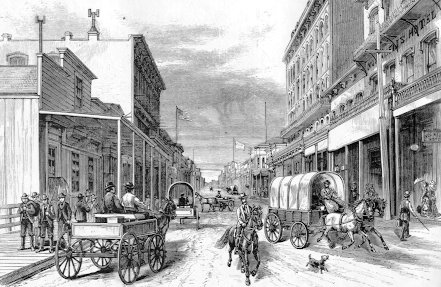
With the 1860s came the Comstock Lode in Nevada. Virginia CIty became one of the new towns where gambling dominated the main streets. The Gentry & Crittenden Gambling Saloon featured a no-limit faro table presided over by Hamilton Baker. Carson City also flaunted gambling and in Gold Hill the top dealer was William DeWitt Gibson, who later became a Nevada state Senator.
As the Union Pacific meet the Central Pacific at its historic linkup in Promontory, Utah, May 1869, many end-of-track towns shrug up along the rail line, know as "Hell on Wheels." These camps soon became gathering points for the sporting world, including hundreds of tin-horns. Thieving gamblers and forgettable small-timers, but a few went on to prominence like, John Bull, Canada Bill Jones, Doc Braggs and Ben Marks. Many of these gamblers were more confidence operators who fleeced their victims with three-card Monte and thimlerig.

The decade of the 1879s saw the birth of the notorious cow-towns of Abilene, Newton, Wichita, Ellsworth and Dodge City, brought upon by the great trail drives of Texas longhorns to the Kansas rail heads. Some of the most celebrated names in western history began in this period like: James Butler "Wild Bill" Hickok, Wyatt Earp, Ben Thompson, Bat Masterson, Doc Holliday and a young man who's destined to become the greatest professional gambler of all, Luke Short. It was no accident that many of the top gunfighters of the era were also members of the sporting fraternity. Tough, steel-nerved men, who had acquired the shootist reputations, found themselves in demand as dealers in the gambling clubs.
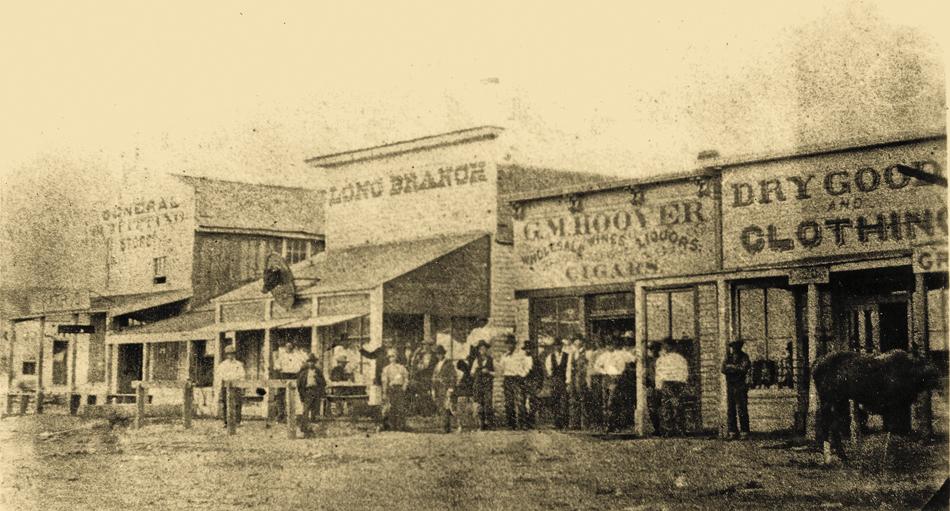
Miners and drovers were quick to seize the opportunity to match wits and gambling skills with the frontier celebrities, across the green felt. Since the open display of cash was a constant attraction for criminals, the mere presence of men known to be adept with the Colt, discouraged the lure to steal. Although many tried. The great dealers were the best cheaters, because it gave them the edge over the punters who made their best attempts at trying to cheat themselves.
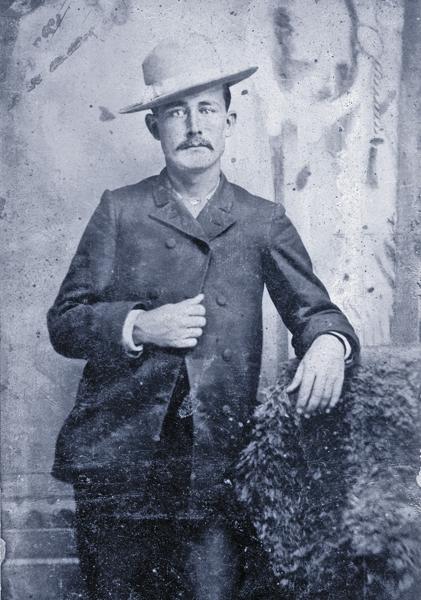
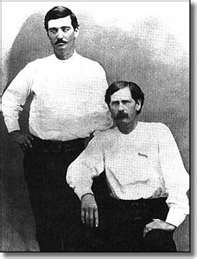
Dodge City
Bat Masterson & Wyatt Earp
Luke Short
In the mid 70s Gold is discovered in the Black Hills of the Dakota Territory. Quickly a town was developed in a gulch filled with dead trees and was named Deadwood. In 1876 brothers Charlie and Steve Utter led a wagon train to the camp filled with prostitutes and Wild Bill Hickok. Bill preferred poker over faro and while playing at the #10 saloon he was shot in the back of the head by Jack McCall. Ten days later the camp was stricken ed with smallpox. By September Tim Miller opened the Bella Union and Al Swearengen the Gem Variety Theatre, both relished in gambling, women and drink. It was during that time George Custer's 7th cavalry was slaughtered by Indians at the Little Big Horn, not far from Deadwood.

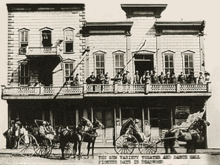
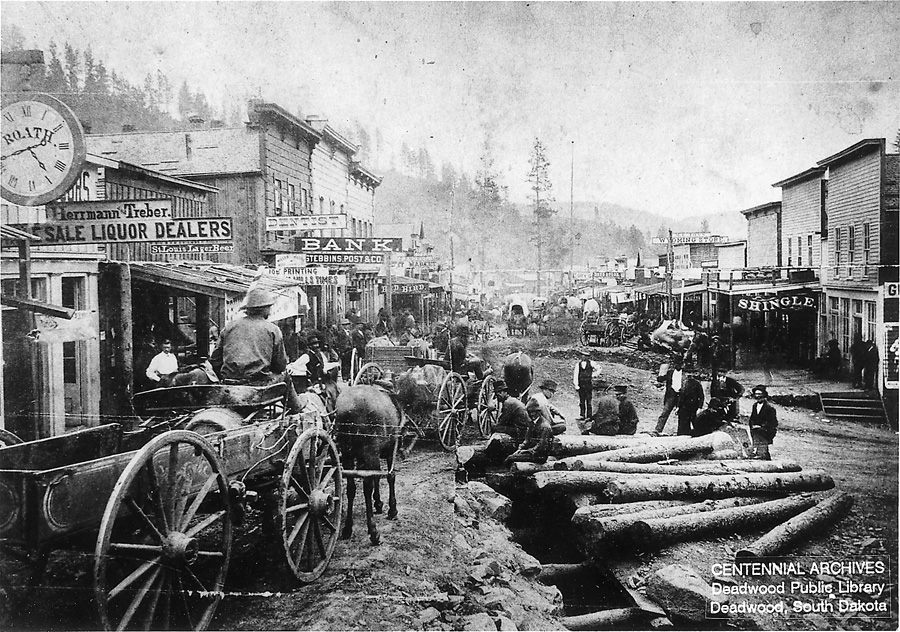
Deadwood
Gem Variety Dance Hall and Saloon
Add Text Here...
In the late 1870s Leadville had blossomed overnight into the largest city in Colorado. At it's peak, gambling opportunities were afforded in more than 150 resorts ranging from small saloons to elaborate theaters and concert halls. Most of the leading western gamblers including Ben Thompson, Bat Masterson, Doc Holliday and Luke Short, all had stories to tell of Leadville. Doc was suffering one of those streaks of bad luck that plagued all sporting men at one time or another, had to leave town in a hurry over a $5 debt that ending in a killing. Luke Short got into a shooting affair over the faro table, and Ben Thompson got heated after losing $3,000 in a faro game and turned over the table, jerked his Colt, and shot up the saloon.
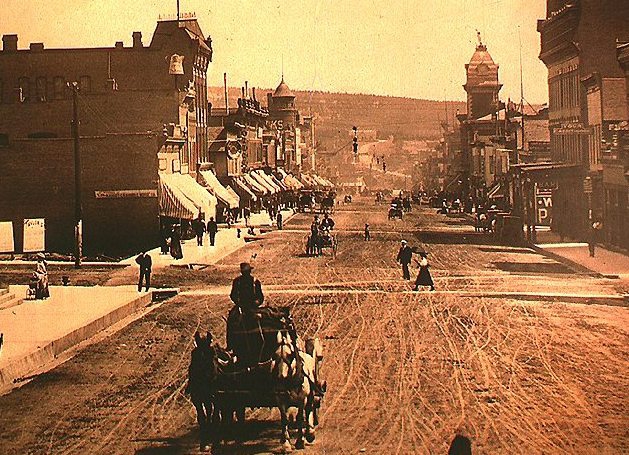

Leadville
Ben Thompson
The silver strike at Goose Flats in 1879, quickly turned the Arizona desert into the place to be. The town was called Tombstone and the leading drinking emporium in the boom town was the Oriental Saloon. Milt Joyce ran the saloon while the gambling concession was leased to Dick Clark, of the Colorado mining camps, Lou Rickabaugh, a San Francisco sport, and Bill Harris owner of the Long Branch Saloon in Dodge. Before long gambling became so popular at the Oriental that it adversely affected business at other resorts in town. Competitors hired Johnny Tyler, a gambler of some fighting notoriety, to lead a gad of toughs into the Oriental every night to start a ruckus and intimidate patrons.
Add Text Here...
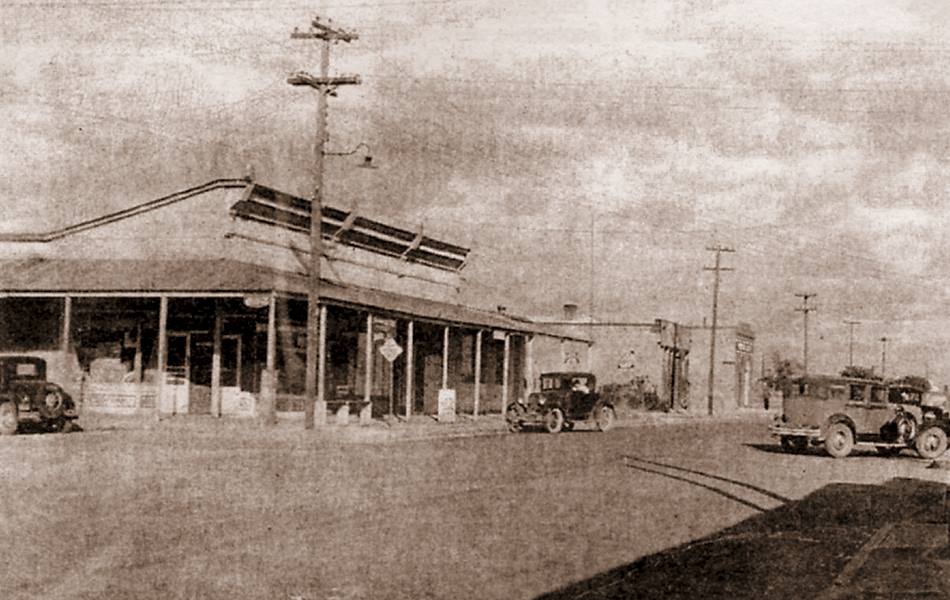
The Oriental retaliated by offering Wyatt Earp a quarter interest in the business if he would handle Tyler and his cohorts. Wyatt sent for the best and most dangerous dealers in the country, Luke Short, Bat Masterson and Doc Holliday. The gang of gun fighting luminaries was too much for Tyler, who soon left town. The Oriental bloomed once again, however in short time the gathering of grand sporting men began unraveling. A well-traveled professional gambler of note, Charlie Storms, took offense to the faro play of Luke Short and called him out. In dramatic fashion Luke killed Storms on the boardwalk of the Oriental. Soon after Bat Masterson received an urgent telegram from his brother James, in Dodge City. It wasn't long before Luke, Bat and Bill Harris departed Tombstone, leaving Wyatt and his brothers, along with Doc Holliday, to gain immortality for their participation in the Gunfight at the O.K. Corral.
Tombstones Oriental Saloon
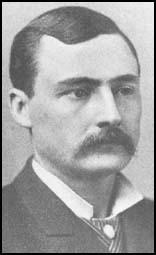



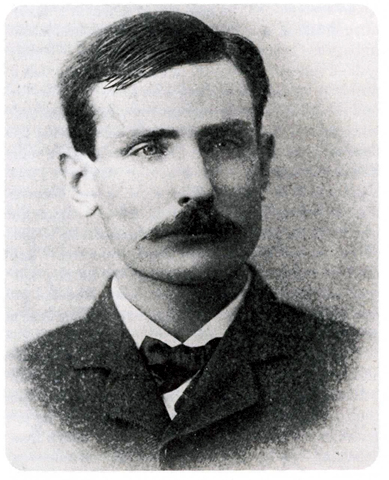
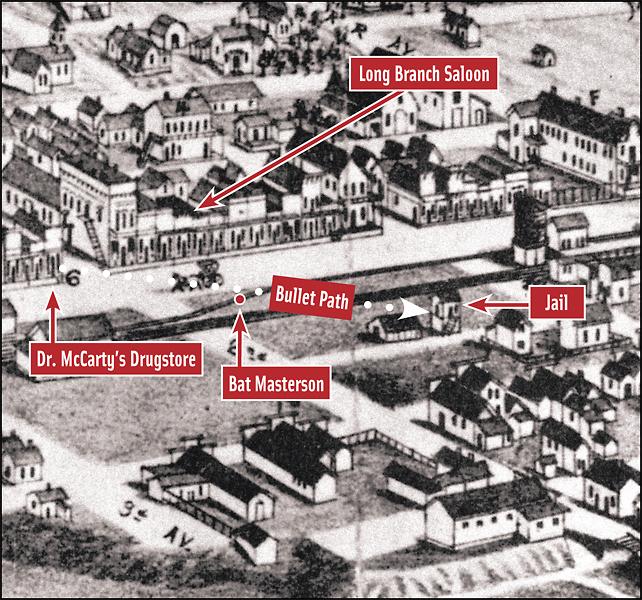

Luke Short Bill Harris Doc Holliday Wyatt Earp Bat Masterson
James Masterson's wire for help was on account of a dispute with his partners A.J. Peacock and Al Updegraff in the Lady Gay Dance Hall in Dodge City. The moment Bat's train pulled into the depot at Dodge he was confronted by Updegraff and Peacock resulting in what is now called the Battle of the Plaza. Updegraff took a bullet to the lung and a bystander was wounded, but no one was mortally injured. Bat Masterson was fined $8 with $2 in court costs and escorted by the new city council, to the train station, ordered never to step foot in Dodge City again.
James Masterson

In 1883 Luke Short bought into the Long Branch Saloon with partners Bill Harris and Chalky Beeson. Their political party aptly named the Saloon Ticket, lead by Hound Dog Kelly, was under assault by the women's national Temperance and Reform movement. The Long Branch became the focus of their attack and ordinances were passed resulting in a raid on the Long Branch and the incarceration of it's employ. Luke made his way to bail out his fellow saloon workers and was shot at by a town deputy. Luke shot back and barricaded himself into the Long Branch awaiting an all out assault. Instead he was convinced the next morning to lay down his arms and surrender. He was escorted to the railroad station and told never to return.
Long Branch Saloon, Dodge CIty
Luke stopped at the first telegraph office and sent wires to a few of his friends, thus beginning what was called in the national newspapers; "The Dodge City War". Bat Masterson met Luke at the Kansas Governor Glick's office and filed a complaint against the Dodge City council. Defiant the council fought back with propaganda claiming the gambling element to no longer be welcomed in Dodge, and to enforce their play, they hired a small army of guns to protect the town. Luke had gathered his own gang of notorious gambler/gunfighters and threatened to take the town by storm. The panicked council appealed to the Governor for help but were awarded none. Luke and his men walked into town and without firing a shot quietly took over, reinstating his business at the Long Branch and removing those members of the city marshal's office who opposed them. In celebration they had a photograph taken, calling themselves the "Dodge City Peace Commission".
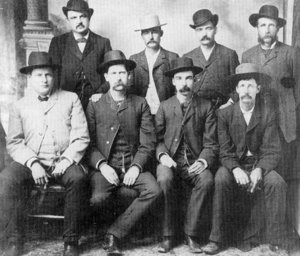
Bill Harris, Luke, Bat, Bill Petillon Charlie Bassett, Wyatt, McClean, Neil Brown
By the 1880s a gambling circuit had developed, professional gamblers moved around the country, sometimes following the seasons but mostly following the latest report of a mining strike or cattlemen convention. San Francisco now harbored the Barbary Coast, a sin center of worldwide notoriety. Denver, Kansas City, Omaha, Hot Springs, Austin, Fort Worth and Las Vegas New Mexico, were all recognized as wide-open gambling communities.

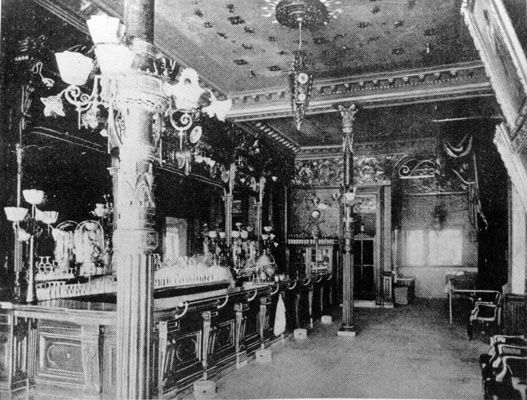
In March of 1884, gamblers Ben Thompson and King Fisher attended the Vaudeville Variety Theatre in San Antonio, when their box seats came under a hail of bullets. The assassination was carried out by Jacob Coy, Joe Foster and Billy Simms. King Fisher was shot 13 times, but was able to fire one round in retaliation crippling Coy for life. Ben Thompson was killed instantly.


John "King" Fischer
Ben Thompson
Gambling, with its get-rich-quick appeal, has always attracted a criminal element. Perhaps the most famous member of this gallery of rogues was Jefferson Randolph "Soapy" Smith. It was Soapy proclaimed: "I am no ordinary gambler who hazards his own money in an attempt to win another's. When I stake money, it is a sure thing that I win." Jeff perfected the shell and pea, game, and invented the soap scam, selling soap bars for $5 with the promise that some bars had $20 bills hidden beneath the wrapping. Some lucky person always found a winner, but the person was always a Smith shill. The nickname Soapy was derived from this con, but Jeff never liked the moniker.
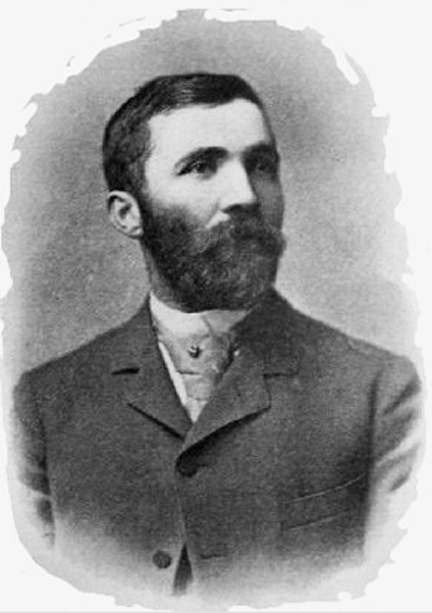
Jefferson Smith
It was the modern city of Denver, 1888, where Soapy partnered with Big Ed Chase and opened the Tivoli Club. In the casino hung a sign which read: "Caveat Emptor", Latin for, "let the buyer beware". When challenged in court Soapy claimed that by winning the sports money. the Tivoli did more to discourage gambling than any other reform method. The Denver newspaper dubbed the Tivoli Club, "the slaughter pen", due to the violence in the house. Denver developed a long line of gambling scoundrels including Vaso Chucovich and Lou Blonger. Their games included bunco and stock swindles.
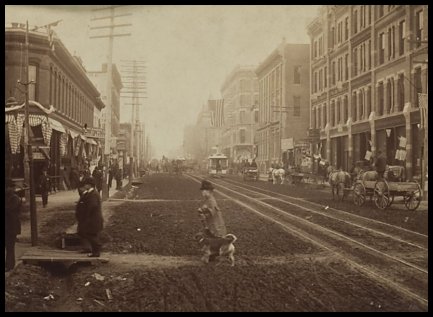

Ed Chase
Denver

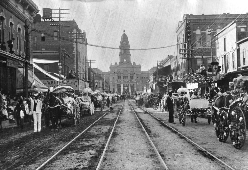
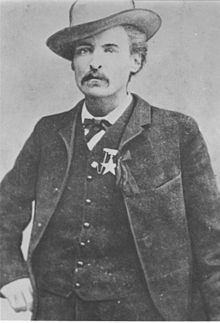
1887 finds Luke Short in Fort Worth Texas where he has created the finest gambling establishment west of the Missouri, The White Elephant Saloon. Although Luke still graced the crowd with his faro dealing expertise his casino featured the newly popular Kino game, as well as sponsoring horse racing and boxing. He was the sporting boss of the city, until the ex-marshal of Fort Worth, Jim Courtwrite emerged on the scene. Courtwrite set up a private detective business that included protection for the casinos of "Hell's Half Acre", however his attempts to expand the racket uptown was stymied by Luke Short. He figured he had enough of a reputation to keep the peach in his establishment but Courtwrite would not relent. The conflict came to a head just as Bat Masterson arrived in town for a visit. With the grand courthouse looming down main street, Luke Short met Jim Courtwrite in the dark of night. Perhaps the only real gunfight where two legendary man killers met face to face. The odds were on the gun hand of Courtwrite but Luke was able to get off the first shot, hitting Courtwrite's pistol and blowing off his thumb. Before Courtwrite could affect the boarder switch, Luke shot him 5 times. The gunfight brought fuel to the growing reform movement and Luke was forced to move his gambling activities underground. The professional gambler in the United States was for all practical purposes, now considered an outlaw. Luke continued to be an advocate for legal gambling so much so that he single handedly tore apart a gaming hall that was famous for cheating and swindling. Upon leaving the saloon the owner shot Luke in the back with a shotgun. Luke recovered from the wounds but died in bed a year later, in 1894, fromDropsy.
Add Text Here...
Jim Courtwrite Fort Worth Texas Luke Short
In the 1890s gold was discovered in the Klondike region of Canada's Yukon. The last great rush for a new mining district was on, both for the miners and those with the purpose of mining the miners. Some of the most colorful professional gamblers made it to the assortment of saloons, brothels and gambling halls newly developed. Many made it rich, and many did not. Harry Wollrich had $60,000 in his pocket ready to board a steamer home. Before leaving he flipped a half dollar on a faro layout and 24 hours later had lost all his money and the steamer ticket home. George Lewis "Tex" Rickard owned, prospered, and lost two gambling houses. He began promoting prizefights in the Klondike and ended up being the promoter of the multimillion dollar fight in the 1920's featuring Jack Dempsey. Wyatt Earp also went to Alaska and opened the Dexter Saloon in Nome, advertised as "The Only Second-Class Saloon in Alaska". Wyatt sold his share to his partner Charlie Hoxie and returned to California with $85,000.


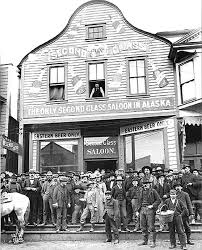

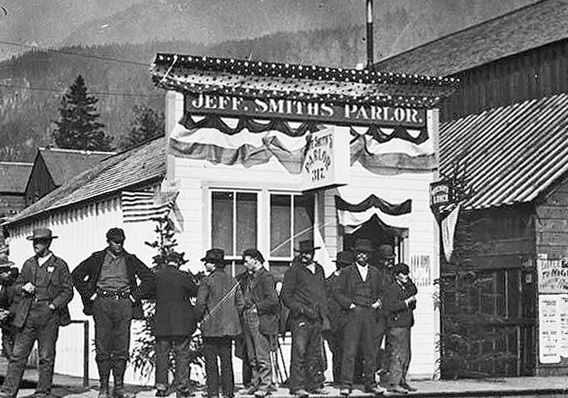

Soapy Smith set himself up as the underworld boss of the tent city in Skagway Alaska. The miners were in such a hurry to get to the mines that the job of a con man was all to easy. Even when caught victims rarely stayed around to enforce any complaint. Especially
Add Text Here...
Since the local authority was on the payroll of the Soap Gang. One con was to offer the miners telegrams home to loved ones, even thought there were no telegraph poles in Alaska. Soapy's magnetic personality made him a popular man about town. He was the Grand Marshal of the Independents Day parade and had a considerable following. However, not with the Skagway reform committee who issued a proclamation that read: "All Confidence, Bunco and Sure-Thing men are notified to leave Skagway Immediately.
On an evening in July, 1898, the anti-Soapy faction held a meeting in a warehouse on the end of the Juneau Wharf. Soapy grabbed his Winchester and proceeded down the Wharf, being cut off by Frank Reid and a team of four guards. Both men drew arms and shot. Soapy died on the spot and Reid some 12 anguished hours later.
Juneau Company Wharf
The exciting age of western gambling had all but folded with the closing of the frontier. The rise of anti saloon and woman suffrage reform was winning. State after state passed legislation outlawing gambling. Nevada alone bucked the tiger. The boom mining camps of Goldfield, Rawhide and Tonopah Nevada were in full swing. Wyatt and Virgil Earp were there. George Wingfield started out as a dealer in the Tonopah Club and invested his winnings in the mines. By the age of 27 George was worth more than two million dollars. He became a powerful figure in Nevada politics. Faro is no longer played in casinos, mostly due to the fact that the odds do not favor the house enough. In the Delta Saloon in Virginia CIty Nevada, a favorite attraction is the famous Suicide faro table. Claimed to be responsible for the death of it's three owners. Today the table is encased under plexiglass, to enshrine the antique, but also to protect from anyone else falling under its spell.
